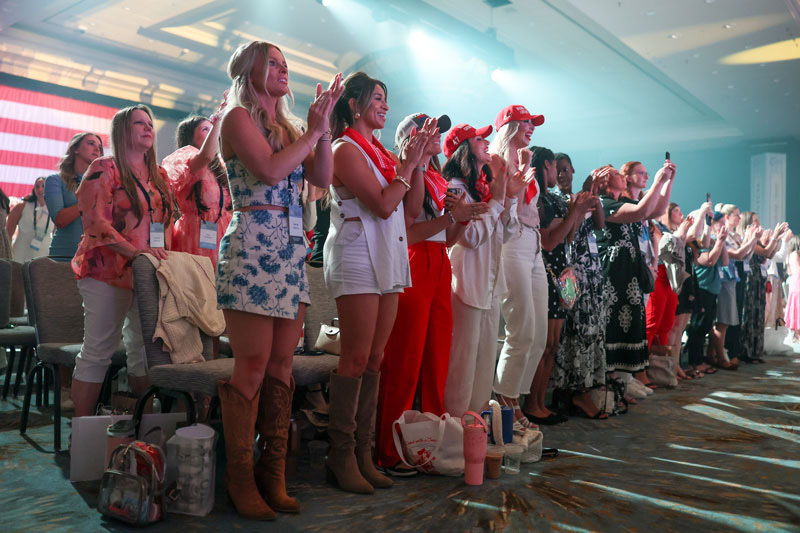Thousands of people gathered in Grapevine, Texas, to attend Turning Point USA’s 10th annual Young Women’s Leadership Summit in June. For three days, prominent conservative women made a pitch to a crowd of women and girls mostly in their teens and 20s: Trade feminism for femininity, ditch your career aspirations, and focus on finding your husband and becoming a stay-at-home mom.
For Turning Point USA (TPUSA) and the broader hard right, their vision for America requires women who are willing to stay at home and raise the next generation of conservatives. By putting women at the forefront of its male supremacist work, TPUSA can reframe traditional gender roles as empowering rather than regressive and soften its image to make the group’s messages more palatable to mainstream audiences.
TPUSA is a hard-right student organization known for throwing flashy, expensive, multiday conferences primarily targeting young people. These events regularly platform xenophobic, racist, sexist, homophobic and other hateful views. The nonprofit has links to Southern Poverty Law Center-identified extremists as well as prominent conservative politicians, including President Donald Trump.
TPUSA is particularly effective at marketing to younger audiences and has recognized the crucial role women play in cultural and political change. Since 2015, TPUSA has organized its annual Young Women’s Leadership Summit. Charlie Kirk, founder and CEO of TPUSA, described the event on the organization’s website as “a sanctuary for women who embrace faith, family, wellness, and freedom.” This year’s conference, held from June 13 to June 15, drew approximately 3,000 majority-white, cisgender female attendees from across the country. Ahead of the event, organizers sent out a Pinterest lookbook with the event’s recommended aesthetic. Attendees embraced it, showing up in pastel and floral sundresses, cowgirl boots and hair ribbons.
The theme, “Welcome Home,” promoted a return to “traditional” America. The venue was decorated with pastels, gingham prints, bows and embroidery, and reflected a hyperfeminine aesthetic that seemed to be inspired by the antebellum American South.
The event was sponsored by such organizations as the National Rifle Association, Patriot Mobile and Rumble, a video-sharing platform known for hosting extremist content. In the vendor hall, attendees could purchase “clean vitamins for conservative women” or apply for a fellowship with The Heritage Foundation, the long-standing right-wing think tank behind Project 2025, the regressive plan to radically reshape the federal government. TPUSA booths distributed stickers, posters and pins with phrases like “Crunchy Girls for the Constitution,” “Womanhood Is Not a Costume” and “I Don’t Need a Degree to Succeed.”
One Barbie-pink TPUSA booth had a Mean Girls-style burn book where attendees could write insults next to unflattering photos of progressive leaders — most of whom were women. The page for former first lady Michelle Obama accused her of secretly being a man with higher testosterone levels than former President Barack Obama — a contemporary example of the racist trope portraying Black women as masculine and therefore “justifiable” targets of violence. On the page dedicated to U.S. Rep. Nancy Pelosi, the first woman elected House speaker, one note read “DIE!” while another called her an “evil witch.” Another ominously warned, “Your times [sic] coming soon.”
The health-to-hard-right pipeline

Alex Clark opened the conference by telling the audience: “You are witnessing a cultural revolution. Less Prozac, more protein. Less burnout, more babies. Less feminism, more femininity.”
Clark is TPUSA’s bold and stylish pop culture and lifestyle influencer. She is central to the organization’s appeal to young women and girls, to whom she refers as “cuteservatives.” She is the host of the conservative health and wellness podcast “Culture Apothecary,” where she champions U.S. Health and Human Services Secretary Robert F. Kennedy Jr.’s “Make America Healthy Again” movement. She questions rigorously studied childhood vaccine schedules, derides abortion and hormonal birth control and, with no conventional training in medicine or nutrition, helps spread skepticism of government food regulation and the pharmaceutical industry.
In an interview with The Washington Post, Clark discussed the wellness-to-far-right political pipeline she promotes. “It’s sneaky,” she explained. “I want to be seen as: Alex Clark, cool girl, loves health and wellness, happens to be conservative. I’m not trying to beat people over the head with that. I don’t think that’s persuasive.”
As Caroline Criado Perez, author of the book Invisible Women: Exposing Data Bias in a World Designed for Men, explained to The Guardian, this strategy is effective not only because it disguises ideological content, but because it taps into why women turn to alternative medicine. A large body of medical studies shows women are more likely to suffer from chronic pain and autoimmune disorders. Due to medical bias, their pain is taken less seriously, their symptoms are often dismissed and the underlying conditions are under-researched and poorly understood.
The pipeline from the wellness movement to far-right politics and conspiracism is extensively established by research. Wellness conspiracy theories can be persuasive to women in these circumstances because they validate their pain and offer them simple explanations and what feel like solutions. These conspiracy theories prime such women to fall into the “us vs. them” narratives that lie at the root of far-right ideologies. “They want you weak, worried and waiting for permission,” Clark said at the conference. “Conservatism wants you strong, sovereign and living a life so beautiful they feel like they have no choice but to censor it.”
Throughout the summit, speakers emphasized the link between health and politics. They critiqued COVID-19 restrictions, praised efforts to remove fluoride from drinking water and celebrated Kennedy’s “Make America Healthy Again” movement. They also spread disinformation about vaccines and advised the audience to remain natural and avoid poisoning their bodies with seed oils, synthetic fabrics and birth control.
These narratives positioned the women in the audience to be the vanguards of the movement to protect American values through health and wellness. “The kitchen is where the real revolution starts,” Clark told attendees on night one.
‘You can’t have it all’

Throughout the conference, the speakers encouraged attendees to prioritize marriage and motherhood over education and career aspirations. On the first night, Charlie Kirk criticized the audience for not prioritizing finding a husband every single day. However, his gender essentialist worldview did not make this pursuit sound appealing. “You must understand that a man might forget to shower for three days because he’s too worried that we’re going to go to nuclear war with Iran,” he warned.
His wife, Erika Kirk, warned, “I don’t want you to be chasing a paycheck and a title and a corner office and sacrifice such a short window” to get married and have children. The next day, Charlie Kirk called college “a scam” but advocated we “bring back the MRS degree” and that the audience should “be clear that’s why you’re going to college.” For this narrow version of womanhood, the single most important role is to serve in the home. Everything else a woman pursues over the course of her life is secondary to her role as a wife and mother.
At the same time, the lineup of speakers revealed an array of powerful, career-driven women who worked hard to become dominant voices in right-wing media and politics. One 15-year-old attendee called out this misalignment. She asked Charlie Kirk to clarify the summit’s mission. “It’s a young women’s leadership summit, and all of the women that spoke on that stage today and yesterday were there because they pursued a career,” she pointed out. “And a key takeaway that I took from most of the speeches, especially on Friday, was that I should ‘get married and have babies.’” Charlie Kirk dismissed her concern, telling her: “The people that pursued careers are telling you to pursue kids. Maybe they know something you don’t.” He later added that he hoped the audience would “walk away with a warning that a career-driven life is very empty.”
Many speakers repurposed feminist talking points about the burnout many women experience as they try to balance their careers with their families. “You cannot have it all at the same time,” radio host and former Breitbart News writer Dana Loesch said. “Something will suffer.” This was a common refrain throughout the event.
Rather than calling on men to share the burden of household responsibilities or demand a better social safety net to support working mothers, speakers called on women to abandon their career aspirations. While this may sound restrictive, for young women feeling trapped by society’s impossible expectations of them, this message can sound both appealing and liberating.
Additionally, many of the speakers presented traditional, regressive values as countercultural and revolutionary. After claiming abortion was part of “a war on civilization itself,” Lila Rose, founder of the anti-abortion organization Live Action, told attendees, “The biggest revolutions are won at the dinner table, not in the legislature.”
Loesch criticized the protesters in Los Angeles demonstrating against the actions of U.S. Immigration and Customs Enforcement for not being real revolutionaries. Instead, she claimed: “A revolutionary goes and gets her nails done. A revolutionary gets her hair done. A revolutionary wears heels, or cute flats. A revolutionary loves her family, loves her country, raises her children, adds to her community, serves, attends church.” She went on to add that having a family “is perhaps the single most revolutionary thing you can do.”
‘Christians are not called to empathy’

Throughout the three-day conference, anti-immigrant and anti-LGBTQ+ narratives were interspersed between these broader messages of conservative women’s empowerment and traditional roles.
U.S. Rep. Beth Van Duyne alluded to the racist “great replacement” theory, alleging: “It all gets down to power. You’ve got a lot of Democrat cities and a lot of Democratic districts that are losing population … and that they are happy to give up control, they’re happy to give up our freedoms and our safety, in order to be able to have more population there so that Democrats don’t lose their district seats in Congress.” She also claimed all undocumented immigrants are criminals and framed immigration as a threat to women’s safety.
Similarly, anti-LGBTQ+, antifeminist and Christian nationalist podcaster Allie Beth Stuckey said Americans shouldn’t be swayed by the emotional stories of immigrants. She claimed that for each story of a vulnerable mother trying to support her family, there are three stories of violent criminals, particularly emphasizing stories of young white women who were victims of violence. She did not back these claims up with statistical evidence, instead relying on a handful of anecdotes.
Stuckey claimed progressives are using empathy to manipulate people into supporting undocumented immigrants, affirming transgender identities and recognizing gay marriage, which she sees as toxic. “Christians are not called to empathy,” she explained. “Christians are called to something different and better and bigger and deeper than empathy, and that is love.” But Stuckey’s definition of biblical love is suspiciously in line with the hard right’s authoritarian push to enforce a white Christian patriarchy.
While many conservatives have accepted gay marriage, Stuckey condemned it. “There are victims to redefining marriage,” she said. “The victims are motherless and fatherless children.” She continued: “The definition of marriage matters. Doing everything we can to promote the cohesion of marriage between a man and a woman matters.”
Anti-trans bigotry was woven throughout the conference. Speakers made the false claim that trans people are mentally ill and not “real women.” The largest emphasis was put on discussions of trans girls and women in sports. Several speakers framed the existence of trans women in public spaces as a direct threat to the safety of cisgender women and children, as well as part of an existential attack on womanhood.
Events like TPUSA’s Young Women’s Leadership Summit may not seem like a threat to democratic values at first glance. But ignoring women’s contributions in advancing the hard right’s agenda comes at one’s detriment. In her book Inside Organized Racism, Kathleen Blee suggests “the greatest threat posed by organized racism” is not the public rallies but the mundane ways these movements market themselves to women — which greatly outnumber the rallies but receive far less attention. While women are less likely to be in prominent leadership positions in the far right, they play a critical role in establishing the collective identity, ensuring the longevity and expanding the reach of these movements. Blee notes, “Groups of women who seem innocuous can attract people into racist politics.”
The growing consensus, both scientifically and socially, that gender is a flexible, widely varied characteristic threatens TPUSA’s preferences to uphold the existing rigid, hierarchical social order. In June, its presenters dressed this fundamentalism up in bows and pastels and other hallmarks of hyperfemininity to mainstream the hate and conspiracy theories that make up its vision for America’s future.
Photo illustration at top: Speakers at TPUSA’s Young Women’s Leadership Summit included, from left: Riley Gaines, a former competitive swimmer who campaigns against trans athletes competing in women’s sports; Charlie Kirk, founder and CEO of TPUSA; and Alex Clark, host of the conservative health and wellness podcast “Culture Apothecary.” (Source images from Alamy and Gage Skidmore)



